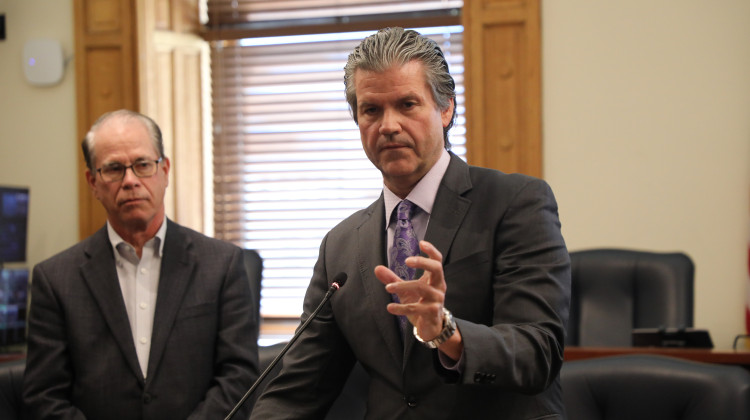Indiana has one of the highest smoking rates in the country -- nearly one in five Hoosiers smoke. Now, a new statewide policy makes it easier for smokers to get medication to help them quit. But some people want state leaders to do more.
On one side of 10th Street in Sheridan, Ind., is a store that sells e-cigarettes and cannabis-derived oil, known as CBD. On the other side, sits one of the pharmacies taking advantage of the new state policy. It allows pharmacists to give out the medication -- without a doctor’s prescription.
As pharmacist Lindsey Angelotti gets ready to open her store for the day, she says she wasn’t surprised to see a vaping store open across the street. “Just makes me more powerful in this community as a member of promoting positive healthy interactions."
She says the new state policy could make a big difference in Sheridan, a town in northernmost Hamilton County. Smoking rates are high and that leads to serious lung problems, including chronic obstructive pulmonary disease.
“We do dispense a lot of inhalers, have a lot of asthma, COPD issues,” Angelotti says. “So definitely smoking cessation is a need in our community.”
State Health Commissioner Dr. Kristina Box says increased access to medications such as Chanitx will help Hoosiers be healthier. And that will help in other areas too -- like lowering the state’s high maternal and infant mortality rates.
"Indiana has a huge issue with smoking,” Box says. “When you look at health, overall, smoking is the single most preventable cause of death and disease in our state.”
There are an estimated 6,500 licensed pharmacists statewide. And 70 to 80 percent of them will participate in the new state program, the Indiana Pharmacists Association estimates.
Getting people to quit smoking is also a great way to save money, says Mike Ripley, Vice President of Health and Policy for the Indiana Chamber of Commerce.
By some estimates, businesses spend $6 billion a year on smoking-related health costs and lost productivity.
“Now, we wouldn't do away with that completely,” Ripley says. “But I think having less people smoking definitely would impact those numbers considerably.”
The new policy from Gov. Eric Holcomb may help people stop smoking, but it likely won’t keep people from starting in the first place.
That’s where the Chamber and others would like the state to do more
The chamber has pushed state lawmakers for preventative measures, like increasing the minimum age to buy tobacco to 21 and raising the 99-cent tax on a pack of cigarettes. But neither has happened.
"Unbeknownst to us, we thought this would be the easiest thing to go after,” Ripley says. "But it's been the most difficult."
And he says Indiana’s poor health rankings have extended consequences. "We have done so well when it comes to making this a great tax state, business climate. But when it comes to health, we have employers that say, how come our health, our health care costs in Indiana are higher than they are elsewhere?"
The 2020 legislative session doesn’t seem promising.
"We're going to continue to push it,” Ripley says. "But we don't think honestly, there's ... going to be a tax increase this session. I don't know that there will be an appetite there because it's going to be an election year."
So for the time being, a lot rests on the new state policy on medications. It remains to be seen how many people will participate in this new state program.
Smoking a cigarette next to the Memorial Monument in Indianapolis, 21-year-old Samuel Daniels says he started smoking at 15. He hadn’t heard of the new policy but doesn’t plan on quitting any time soon.
“Cause I’d rather do what I want to do rather than stop completely,” he says. “I have this like no-care attitude towards everything so I guess that’s my point of view on it. But other people might just want to quit but can’t.”
This story was produced by Side Effects Public Media, a news collaborative covering public health.
 DONATE
DONATE











 Support WFYI. We can't do it without you.
Support WFYI. We can't do it without you.